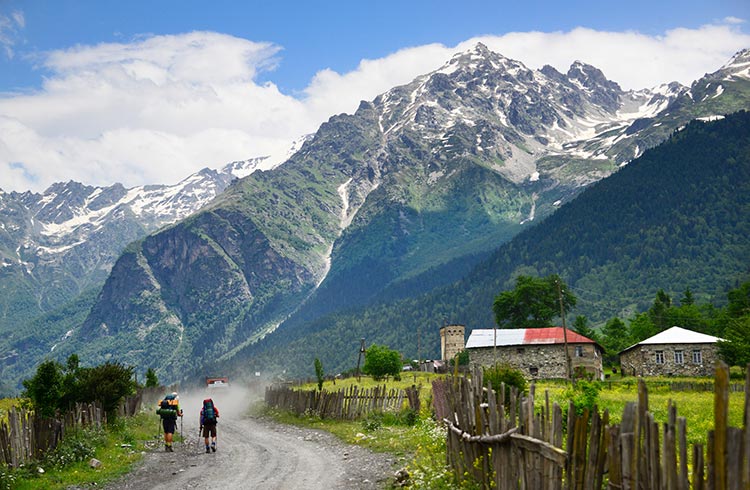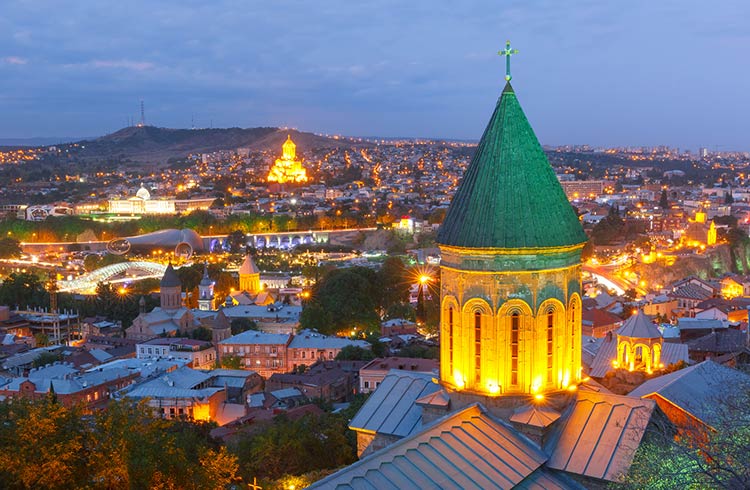Traveling to Georgia? 8 Tips on How to Stay Healthy
What is the standard of medical facilities in Georgia? Find out about health concerns before you go, from rabies to malaria, this is what you need to know.
 Photo © Getty Images/Maya Karkalicheva
Photo © Getty Images/Maya Karkalicheva
- Medical help and medicines in Georgia
- Rabies in Georgia
- What vaccinations do I need for Georgia?
- Malaria in Georgia
- Can I drink tap water in Georgia?
- Will I get food poisoning from Georgian food?
- How do you say cheers in Georgian?
- Can you take prescription drugs into Georgia?
- Listen to The World Nomads Podcast: Georgia
1. Medical help and medicines in Georgia
One of the odd – but ultimately delightful – things I noticed immediately after emerging from the airport in Batumi recently, was the number of street dogs around.
Being a dog lover, I felt sorry at first, then while walking around the city, I realized they all had colored tags on their ears, were friendly and refused food – suggesting they weren’t hungry.
A city official explained that the state neuters and vaccinates the dogs and city merchants and families feed them. I ended up walking the parks, foreshore and the spectacular waterside Botanic Gardens (the biggest of the former Soviet Union) accompanied by friendly tail-waggers.
2. Rabies in Georgia
That said, travelers should be aware that canine rabies remains common in the South Caucasus including Georgia, and while stray dogs are vaccinated in cities, districts in non-urban areas may not have the resources to take their animal welfare responsibilities as seriously.
As dogs are the source of nearly all human deaths from rabies, it is important to ensure that your rabies vaccination is up to date. Be circumspect with animals, and if the worst happens and you are bitten, wash the wound immediately with clean water and soap, and seek medical attention as soon as possible.
3. What vaccinations do I need for Georgia?
There are no specific vaccinations required for Georgia, although you should be up to date with normal seasonal vaccines, including influenza and MMR (measles, mumps and rubella) and check with your GP that all booster shots are up to date.
Travelers who plan to explore rural Georgia beyond the cities should check with their GPs to ensure that vaccines against Hepatitis A, which is spread through contaminated food or water, and Hepatitis B, which is contracted via sexual activity or blood (tattoos or piercings) are up to date.
It is sensible to ensure that diphtheria, tetanus and pertussis boosters (an all-in-one for adults) are current.
4. Malaria in Georgia
Visitors planning to tour Georgia’s southern areas should consider taking anti-malarial medication as a precaution. Although there is no risk in the capital, Tbilisi, a course of chloroquine before travel – particularly if visiting during the peak danger period between July and October – means being safe rather than sorry.
Protective clothing and the use of mosquito repellents are recommended too.
5. Can I drink tap water in Georgia?
Mountain springs feed Georgia’s water supply, so drinking tap water is safe but as always, just to be sure in rural or more remote areas, choosing purified water over tap, boiled, hot drinks and pasteurized milk might be wise.
Tummy bugs like giardia are not uncommon, carry a reusable bottle and invest in a reusable water purifier such as a Steripen Adventure Opti, which means you’ll stay tummy safe and also not add to the world’s plastic mess.
6. Will I get food poisoning from Georgian food?
Georgian food is one of the great joys of traveling here, from city restaurants to family homestays, it’s mouthwateringly good. There are stacks of fresh produce (aubergines are a staple and cooked in a gazillion ways), incredible spices and herbs, the world’s best walnuts (they are a massive producer) eaten fresh or ground into the most delicious salad dressings, traditional breads baked in stone ovens with different fillings or shapes depending on the region, are just a few of their specialties.
When I came back from my trip, I bought a Georgian cookbook and wondered why in heaven’s name this food isn’t better known around the world.
I ate like a queen and tried everything without mishap: apart from common sense tips (wash your hands prior to eating, eat cooked vegetables rather than salads if you have a sensitive digestive system), you can feel safe diving into the food scene.
Georgians are also warm and delightful hosts (visitors are regarded as a gift from the Almighty) and everywhere you travel, food (and booze) is the great leveler and welcome gift, so do be prepared for banquet style meals if you are a guest.
Being invited to a Georgian feast, called a supra, is one of my most unforgettable moments, and if you’re traveling for longer than a few days, you will undoubtedly end up at one.
Be aware there will be more food than you can eat in a week – and you will have to pace the drinking – Georgian custom means someone will be declared toastmaster (known as the tamada) and every drink comes with a toast, formal at first – rather less respectable by the end of the night.
7. How do you say cheers in Georgian?
The word to remember is გაუმარჯოს (pronounced gaumarjos) which means ‘cheers’ in Georgian).
Another word of caution: the traditional grappa-style end-of-night shot is known as chacha, and is incredibly strong. Georgians are used to it, the rest of us, not so much.
Hospitality and warm welcomes aside, use your intuition when you are traveling, and if an offer of food or drink from a stranger doesn’t feel right, best to err on the side of caution and not do it.
8. Can you take prescription drugs into Georgia?
Visitors who travel with simple painkillers for a headache or those who take regular prescription medications must be aware that Georgia has a very strict anti-drugs policy, and this imposes restrictions on some prescription and non-prescription medicines which are otherwise commonly available in Europe, the UK and US.
For example, any medicine containing codeine is illegal in Georgia, and it is very important that before traveling, you check your medication with importation regulations with the Georgian Health Ministry website.
There is no need for women to pack sanitary items such as tampons or pads, as these are widely available in cities. Although if hiking or visiting rural or remote areas, pack all basic hygiene supplies and a first aid kit.
If you do need to travel with prescription medicine, British authorities, for example, advise that you carry a copy of your own doctor’s prescription, and ideally, you should keep drugs in their original packaging if you are asked to show what you are carrying.
The Georgian health system, part of the Soviet system until 1991, has gone through enormous reform and change over the past three decades, including vast privatization of hospitals and an effort to expand coverage and introduce universal access to medical services funded once again by the state.
However, the quality of hospitals and medical care, anecdotally from travelers, is that it varies from city to city and can be difficult to access in country areas. Travel insurance, as always, is key.
Listen to The World Nomads Podcast: Georgia
Related articles
Simple and flexible travel insurance
You can buy at home or while traveling, and claim online from anywhere in the world. With 150+ adventure activities covered and 24/7 emergency assistance.
Get a quote

1 Comment
I'm Renting a bicycle in TBlisi and cycling for 18 days.